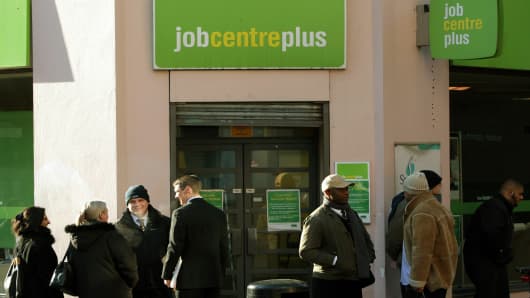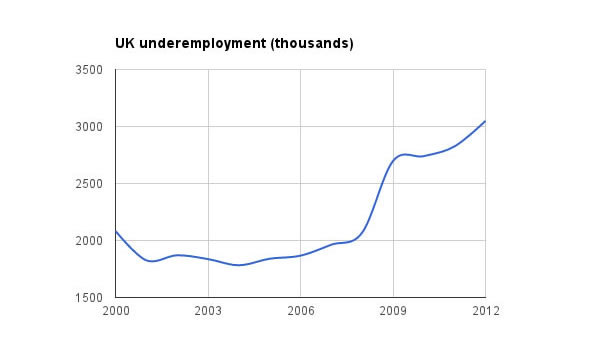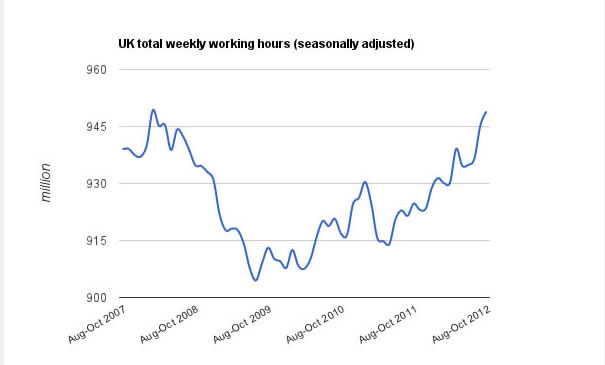Gloomy economic indicators have plagued the U.K. and put the government's austerity plan at risk. The country's triple-A rating remains on the brink, with ratings agencies Standard and Poor's and Fitch both having negative outlooks on its sovereign debt.
One ray of hope has been the country's unemployment rate, which currently stands at 7.8 percent, compared to Spain's 26.6 percent, France's 10.5 percent and 11.8 percent for the euro zone as a whole. The number of people employed in the U.K. is also about to tip the impressive milestone of 30 million people. But there's more than meets the eye to the employment data and analysts say the real picture for the U.K. economy could be even worse.
One London resident knows only too well how hard the jobs market is. Paul Little graduated with a first class degree in English last summer and currently works at one of London's top tourist attractions. His one-day a week shift isn't enough, but his employer is unable to offer him more work.
Little, who's been trying hard to find other full-time or part-time employment is officially classed as "underemployed". The term refers to people who are in employment but want to work more hours.
The local job center has told Little that because he's employed he isn't entitled to unemployment benefits called jobseeker's allowances.
"I can't see myself leaving my part-time job. For me it's better to be in some work than not," he told CNBC.com.
And he's not alone. Underemployment currently affects 3.05 million people in the U.K., a full 10 percent of the workforce.
Numbers released by the Office for National Statistics show a sharp surge in the number of underemployed after the financial crisis took hold. The number has continued to rise and stands at 1 million more than it was in 2008.
Source: Office for National Statistics
"Between 2000 and 2008 there was little change in the number of underemployed workers in the U.K. but it increased sharply upon the start of the economic crisis," an ONS spokesperson told CNBC.com.
"There are many factors behind this increase with some examples being people struggling to find jobs giving the hours they want, some people having a cut in their hours and some maybe wanting more hours for financial reasons."
Record High Employment?
For those looking for more hours of work, things are likely to get worse. Economic indicators since the start of the new year paint a bleak picture. British industrial output grew less than expected in November. Services PMI - measuring business activity – contracted in December, with a reading of 48.9 compared to 50.2 in November.
(Read More: Heavy Snow Heightens Risk of Triple Dip)
According to Markit, the U.K. economy shrank 0.2 percent in the final quarter of 2012, a bigger drop than expected.
Yet jobs figures have remained a rare bright spot and the U.K. government has been quick to trumpet "record high" employment. Excluding underemployment figures, the number is back down to levels in 2008/2009. So, could this mean that the U.K. economy is in a worse state than many believe?
"Headline employment figures have been flattered by the recent surge in underemployment," Richard Exel, a senior policy officer at the national trade union center TUC told CNBC.com.
"There are still 421,000 fewer full-time jobs today compared to five years ago. Over the same period the number of part-time jobs has soared by over 700,000. We know that many people taking on these part-time jobs are only (doing) so for a lack of full-time ones."
(Read More: UK Industry Reports Sluggish Growth in November)
Source: Office for National Statistics
TUC, which produces its own research on the labor market, says that underemployment, combined with tough wage restraint, gives a more accurate picture of the U.K.'s economic health.
"A rise in underemployment is better than the mass job losses experienced in the early 90s recession," Exel said.
"However, rising underemployment is not enough to drive decent economic growth. The fact is that we won't secure a sustainable economic recovery until we see far healthier pay rises and far stronger growth in full-time employment."
(Read More: Honda Says Plans to Cut 800 Jobs in Britain )
'Very Odd' GDP
Professor Len Shackleton, a fellow at the Institute for Economic Affairs, is a firm believer in gauging the economy using employment data rather than gross domestic product (GDP) data which he says is collected in a "very odd way" and frequently revised.
He's noticed that analyzing the total hours worked by the U.K. workforce gives a different picture, which may be a better indicator than the underemployment data.
Source: Office for National Statistics
As the recession hit, the total hours worked fell to 904.5 million in July 2009 from highs of 949.3 million in early 2008. The last set of figures show a recovery to 949 million hours, a rise of 5 percent from the trough. That shows a recovery in the demand for labor, according to Shackleton.
"The underemployment figures represent a wish to work more, but they don't tell us how much more people would like to work, or indeed whether they are actually free to work extra given their family etc. commitments," he told CNBC.com.
"Moreover analysis of the data suggests that those wishing to work more are disproportionately young and unskilled, so their problem may partly be a structural/training issue rather than one of overall demand. Relaxing the 'austerity' (such as it is) of the government's fiscal stance would not necessarily increase their chances of getting extra work."
Employment data for January is due on Wednesday and preliminary fourth-quarter data for U.K. GDP is due on January 25.
—By CNBC's Matt Clinch





